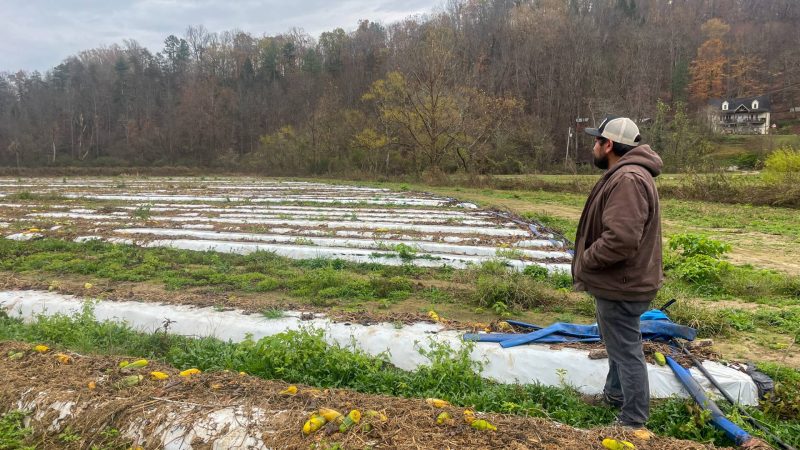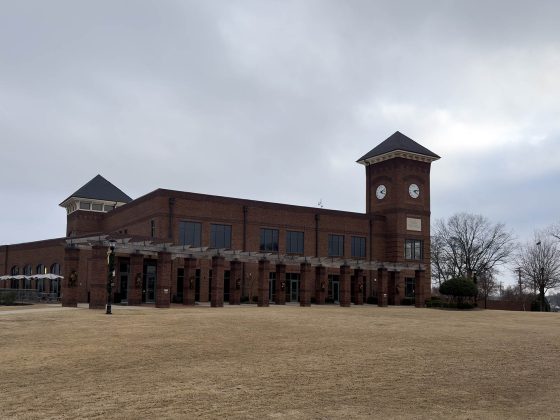When Helene swept through the Southeast in late September, it left widespread damage in its wake. One of the more inconspicuous but significant impacts was on local farms.
The nonprofit Travelers Rest Farmers Market is currently working with eight Upstate farmers impacted by the storm through its Travelers Rest Farmers Market Farmer Fund.
The fund was already active before the storm and began raising capital in October 2023 for two grants: the Crisis Grant and Capacity Building Grant. Since the storm, the fund restructured to focus its fundraising on one grant – the Rebuilding Capacity Grant.

“We interviewed all of our farmers after Hurricane Helene,” said Jessica Mullen, the market’s director of marketing and development. “We interviewed something like 16 of them, and eight of them said they’d be willing to take funds.”
Tropical storms can cause both short- and long-term damage. While direct damage may look like fallen trees, crop destruction or broken tools, lasting damage can include physically unharmed crops that are still considered unsafe due to flooding.
According to the Food and Drug Administration, crops even partially submerged in floodwater can pose a public health risk due to exposure to heavy metals or raw sewage. The resulting exposure requires testing or disposal of crops. Either way, the damage can set back the farmer.
The resulting strain may prove to be complex depending on the size of the farm and the experience of the farmer.
 The nonprofit’s cohort of 41 farms range from roughly one-quarter acre to as much as 400 acres. Some have generations of farming knowledge while others are considered “beginner farmers” with 10 years of experience or less. Mullen said some of the less-experienced farmers are learning as they go.
The nonprofit’s cohort of 41 farms range from roughly one-quarter acre to as much as 400 acres. Some have generations of farming knowledge while others are considered “beginner farmers” with 10 years of experience or less. Mullen said some of the less-experienced farmers are learning as they go.
The fund focuses on aiding farmers in the face of crisis but also by giving the newer farmers support as they learn.
“When we’re talking about starting a new ecosystem of community and food, that means that these farmers have to have safety to try new things or fail,” Mullen said. “When you’re learning a new thing and you can’t make any mistakes, it’s almost impossible to succeed. And so the Farmer Fund exists to help them try new things and also to help them in case of disaster.”
Impact on a local farm
Estrada Farms, near Pumpkintown in Pickens County, was one of the farms willing to accept aid. The farm is situated close to a nearby creek that flooded, with a total of 17 acres affected including roughly two acres of tomatoes, two acres of cucumbers and about 10 acres of peppers under floodwater. Of those 17, only about two were salvageable, meaning floodwater didn’t touch them.
To make matters worse, the farm lost 10 diesel water pumps. Ironically, some of the pumps had been moved farther out in anticipation of the storm, but not far enough.
With many of its fall crops being harvested in late September and October, the storm’s timing was catastrophic.
“It wasn’t so much the wind, it was more of the flooding because all of our fields are located near rivers and streams, and it was a lot of rain,” said Ignacio Estrada. “It got wiped out. I couldn’t even harvest it if I wanted to.”
The farm took a hit of more than $60,000, including crops and the cost of rebuilding the water pumps.
Estrada is a third-generation farmer, following in the footsteps of his father and grandfather, but he said the trade probably dates back further to the family’s roots in Mexico. He got involved with the Travelers Rest Farmers Market in an effort to sell his products locally and in a retail capacity. He believes in the greater quality of buying local produce and encourages the public to buy local crops year-round.
According to Mullen, humility has been a theme with all the farmers. Despite financial and property damages, they have immense sympathy for those who lost more than business during the hurricane.

“Some people lost greenhouses, some people lost their whole crops, like me, but from what I heard, I don’t think anybody actually got hurt or anyone lost their lives,” Estrada said.
How you can help
To donate to the farmer’s market fund, visit travelersrestfarmersmarket.com/donate-to-trfm. To date, losses suffered by farmers within the cohort totals roughly $205,710. The donation portal will stay open until the end of 2024 with 100% of donations going toward the farmers after processing fees.













